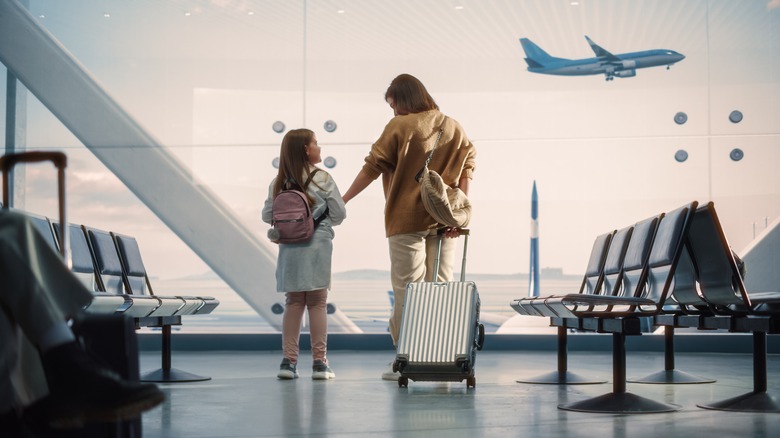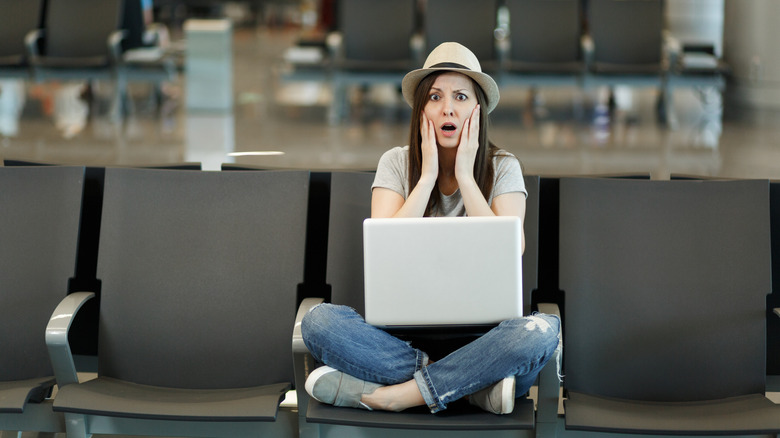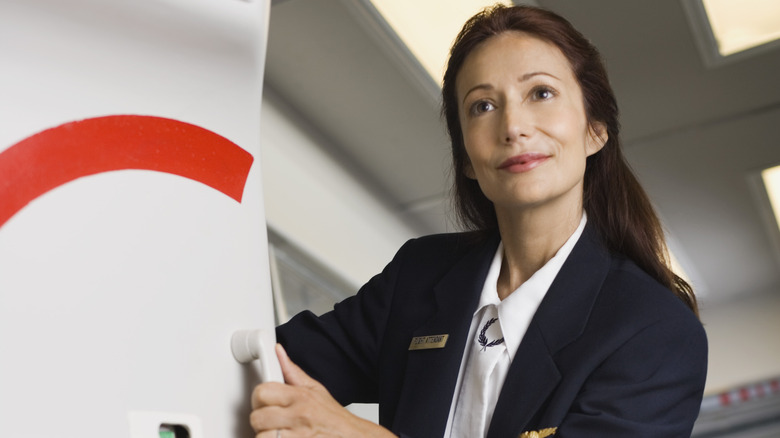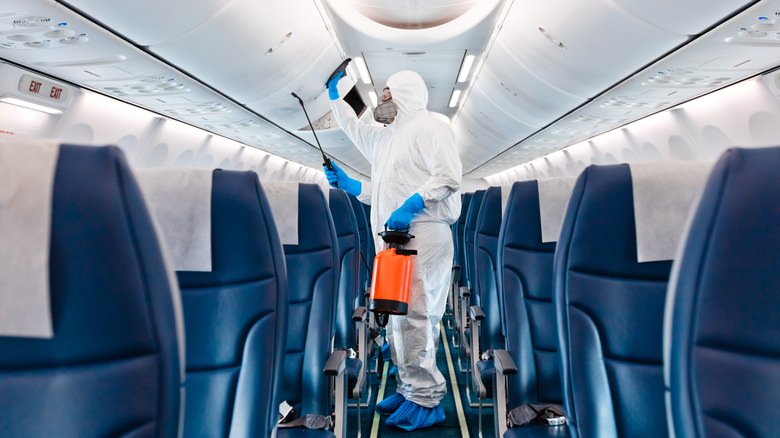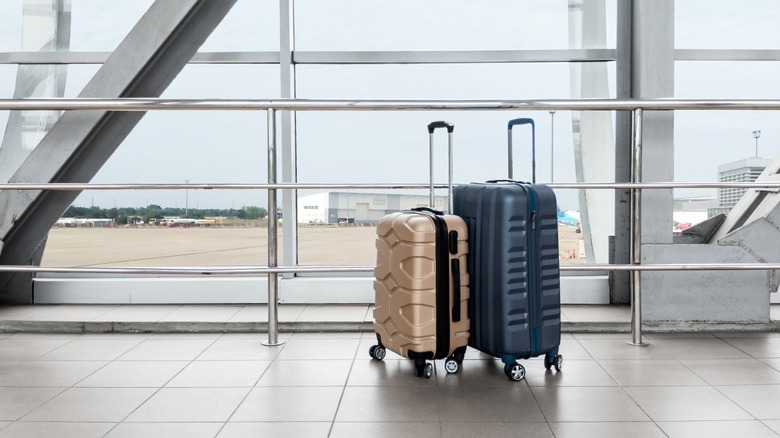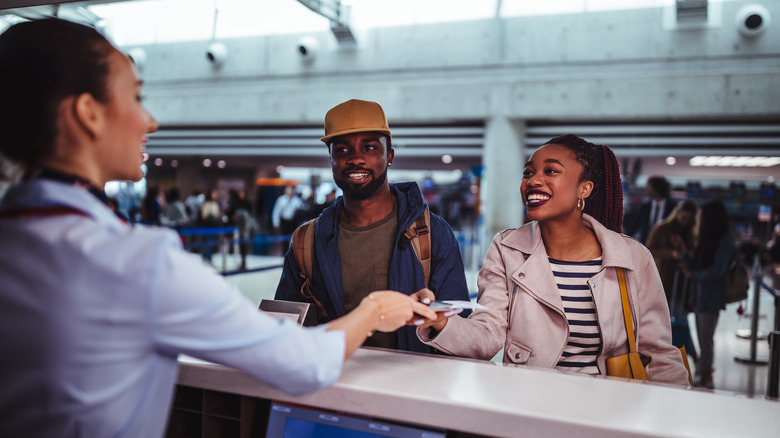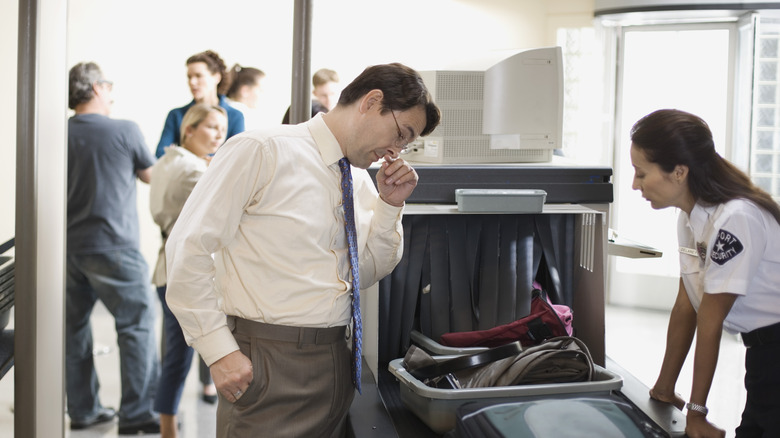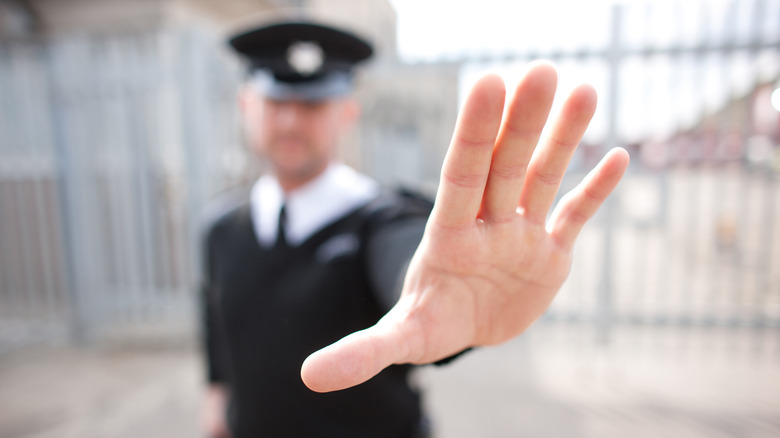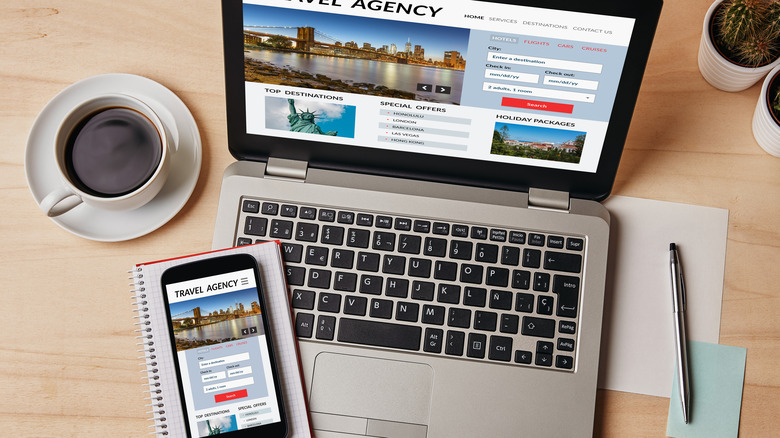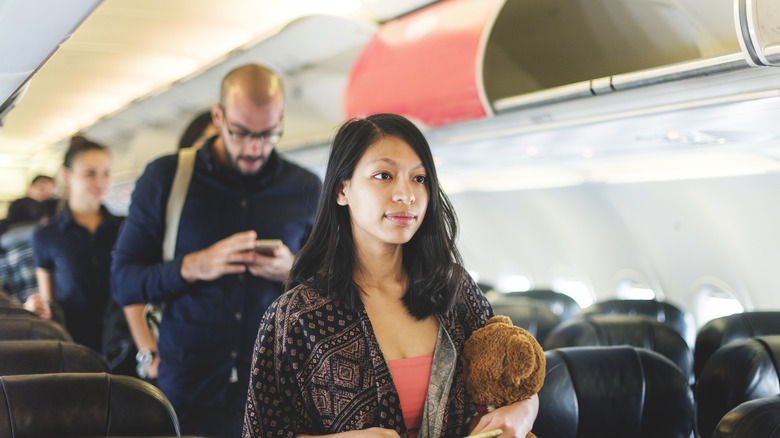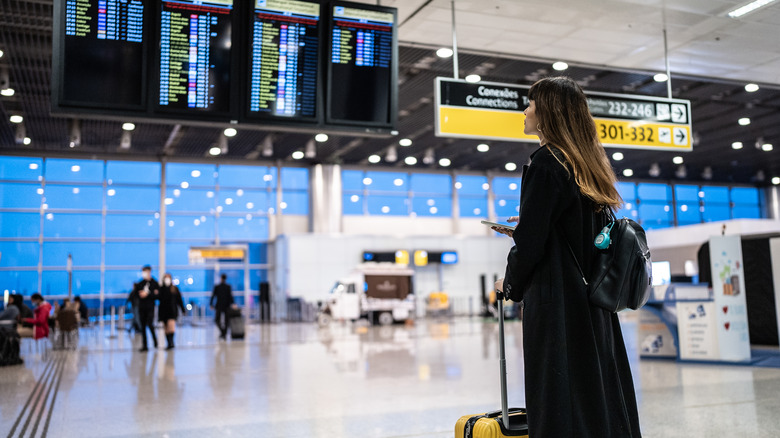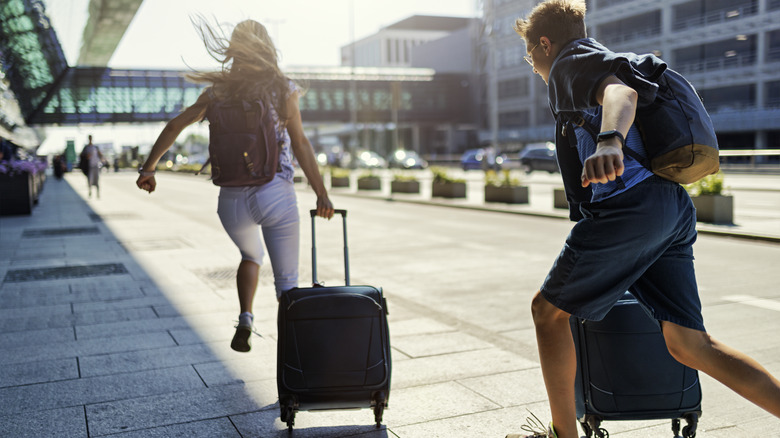11 Things You Didn't Know Airlines Are Allowed To Do
Flying is so common these days that travelers often think of it much the same as a bus journey or even their daily commute. Passengers show up at the airport and line up for the security check — sometimes waiting for a long time, other times zipping through with some great strategies for picking a fast security line. Then, there's the inevitable wait for the flight to board. Sometimes, if you're particularly unlucky, you'll experience one of those famous confrontations at the gate that are making the rounds on social media platforms. Gate agents are often friendly and helpful, but occasionally passengers can get on their bad sides and extract an earth-shattering response. Many travelers have been waiting patiently at their gate only to find a swarm of security personnel show up to either diffuse a situation or haul away an unruly traveler.
Guardianship of boarding is only one perk that airlines and their staff reserve for themselves. It's commonly understood that a gate check agent can refuse boarding for someone for a bevy of reasons, and they may even get testy about the size of your bag. However, there are actually a wide range of powers that airlines hold onto. Some of them are particularly surprising, so knowing what the airline can and can't do is an important thing for you to understand as you prepare to board that flight that will whisk you away on your next adventure.
Airlines often overbook flights
It's a well-known fact that airlines frequently overbook their flights. Some experts claim that for every 100 seats available, on average airlines will sell 150 tickets, leading to constant overbookings on flights all across the spectrum of domestic and global routes. They do this because passengers often don't show up for their flights, rather than canceling if their plans change. This also compensates for the inevitable missed connection. But this can and does lead to more passengers arriving at a gate than can be seated in the plane.
Overbooking is such a rampant practice that nearly every frequent traveler has likely heard a gate agent calling for volunteers to change their itinerary, perhaps multiple times. This is shockingly something that airlines are allowed to do — but there's a catch! The airline cannot simply force you out of your seat without something in return just because they've got too many ticketed passengers. The $140 million settlement that United Airlines paid David Dao after violently dragging him off a plane to make room for a flight attendant proves that point.
Typically (and thankfully), they don't get physical. However, they do incentivize passengers to volunteer. And if the first offer doesn't rustle up any takers, they will continue raising the compensation value until it does (sometimes into the thousands of dollars). If you wait it out long enough, you may get a pretty hefty cash incentive, along with your new flight ticket.
Airlines don't have to pay flight crew unless the door is closed
Airline crew members aren't on the clock until the door closes on the aircraft. This means that all the work they do in the lead-up to the actual flight (checking your bags at the desk and scanning your boarding pass at the gate, for instance) is done in excess of their salaried job responsibilities. Once the door closes and the plane is ready to fly, the crew is paid for their "flight hours." But until this happens, the crew — and most pointedly, the flight attendants — are paid something called "hourly rate," which averages out at just $2.00 per hour!
Often, your interaction with the flight crew before (and during) boarding is pleasant and positive. But with this feature of the airline industry in mind, it's easy to see why the flight crew might be a little short with passengers from time to time. This harsh financial reality might just change your feelings about the next grouchy flight attendant you meet in the buildup to your flight's departure.
They don't have to thoroughly clean the cabin
While COVID-era policies stipulated a deep cleaning of surfaces and even the air within the cabin after every flight, this wasn't always the case. Moreover, it has increasingly become a rarity once again to see a thorough cleaning of the cabin in the time since the pandemic was officially deemed to have subsided as a top tier public health crisis. The "turn clean" is a typical practice between flights once again, and this generally means a quick wipe of the seats, a scan through the cabin for trash, and a tidy of the bathroom. As well, first class and business class seats are given more attention during these wipe downs.
Another feature of the turn clean that passengers should be wary of is in the pillows and blankets that the flight attendants hand out. These are sometimes folded and stuffed back into new plastic packaging without any cleaning at all. Because airlines aren't required to bring the cabin back to a spotless shine between every flight — nor would a deep clean be practical on a regular flight schedule — your best bet if you're worried about the plane's cleanliness is to bring along disinfectant wipes and your own comfort gear.
The airline can deny your lost luggage claim if you wait too long
Airlines generally don't have any problems with moving luggage alongside passengers. However, airport logistics is a complex beast, and this results in plenty of lost bags on a routine basis. From January to September 2022, American carriers lost or mishandled over 2 million bags.
If your checked bag doesn't make it out onto the conveyor belt after your flight arrives, it's important to go directly to the lost luggage desk. The U.S. Department of Transportation spells out an airline's responsibilities in black and white: Airlines must refund your bag fees for the lost luggage and compensate you for the bag's contents after it has been deemed lost. In the event that your bag is delayed, the airline must compensate you (along with returning your belongings) for reasonable and verifiable expenses that arise as a result of the missing luggage.
There's a big caveat here, though. The airline won't know to look for your bag unless you make it known, and the longer you wait, the less likely finding your items will become. Most airlines also have a deadline for lost luggage complaints of just four hours. This means that if you emerge from the airport and wait to call the airline once you've arrived at your hotel, you might simply be out of luck in getting your stuff back or being compensated for the inconvenience.
Skiplagging breaks the terms of carriage, and airlines can and have retaliated
Skiplagging, or "hidden-city travel" isn't exactly a common practice, but it can save you a ton of money if deployed correctly. Travelers who live in or want to travel to a city with relatively low demand can sometimes get a better fare with a connection in this target destination (and a second onward flight to a big city like New York or Chicago) than by booking a direct route. Travelers have been hip to this reality for decades, and skiplagging is an open secret among travel circles and airlines alike. You are legally allowed to book and use any combination of flights that you desire, but the practice is prohibited within the terms of carriage spelled out by airlines. Skiplagging isn't easy to spot if you cover your tracks well, making this hard to police. But airlines do fight back, and sometimes with severe punishments. An airline can deny your boarding or even make you pay the full fare if they uncover your use of the practice. Alaska Airlines claims they will take legal action against skiplaggers, and United claims that practitioners may face lifetime bans on the carrier.
To cover your tracks on your way home, for instance, you'll want to check in with a passport to hide any trace of your intended plans. A North Carolina teen's driver's license caught the attention of desk agents in August 2023 while skiplagging on a flight from Gainesville to Charlotte (with New York as a final destination). This led to a brief detention and additional costs for the flyer. You also should avoid flying the same route multiple times or adding frequent flyer information.
Your chosen airline can flag you for additional screening at the security stage
If you've ever seen the code "SSSS" printed on your boarding pass, you'll be familiar with this one. This code stands for "Secondary Security Screening Selection," and indicates that you've been flagged for additional security checks before boarding. It doesn't mean that the airline intends to deny you but is an indication that you've triggered some kind of red flag in their system. This can be the result of a last minute booking, a ticket paid for in cash, or a flight taken shortly after traveling to a country assessed by the State Department to be "high risk." However, it's also possible that you've just been randomly selected for additional scrutiny — something that also happens from time to time.
The ability of the airline to flag you for additional investigation by TSA agents is a little-known one, but it shouldn't be a problem for travelers who aren't engaged in nefarious behavior! The only thing to note here is that your trip through the security line is likely going to take a bit longer than average, so plan accordingly when moving through the airport.
Airlines can ban certain travelers, aside from referring them to the No-Fly List
The Federal No-Fly List is managed by the FBI and is a tool used most prominently to manage terrorism threats. This is a total blacklisting of a person's ability to fly in the United States. But airlines have their own blacklisting abilities that don't rise to this grave level. Truly unruly passengers — or those who are caught as frequent skiplaggers on United Airlines, it would seem — as well as those who smoke or vape onboard can see their privileges on that airline taken away. It's completely within an airline's rights to either deny a passenger boarding based on the terms of carriage or ban them from using the airline entirely.
It's highly uncommon for passengers to face this kind of repercussion, though. Fortunately, if you do find yourself in this unenviable position, you're unlikely to be banned by other airlines, too. This is a company-specific decision, but it could affect your ability to travel with codeshare partners if the offense is serious enough. United, for example, is a member of the Star Alliance network, alongside the likes of Air Canada, Lufthansa, Swiss, and Turkish Airlines.
They can refuse to work with booking sites, making you come directly to them
Airlines are often unhappy about the use of price comparison sites and tools. Expedia accounted for over $50 billion alone in airline bookings in 2015, showcasing the incredible value that travelers place in these outlets. But every ticket purchased through one of these third party sites eats away at the profits that airlines can pocket. A referral fee encroaches on the earnings, leading some airlines to hold back their flight schedule from third party booking sites.
Delta, United, JetBlue, and Southwest have all been guilty of this practice in the past. The inclusion or exclusion is a two-way street, though. Sometimes there appear to be spats between airlines and booking sites about commissions, and the third party aggregator instead takes down an airline's flights for a time. The result is a sometimes confusing booking experience for passengers seeking to get the best deals on flight itineraries. To ensure you're getting a great price and the best route options, you may need to take note of any conspicuous omissions on a third party site and head directly to the airline to confirm your travel plans.
Airlines can block out seats, attempting to make you pay more to choose one
When booking flights, passengers today will be more than familiar with the seat selection page. Picking your seats on an airplane is a great way to ensure that you have the room you require or can get off the plane quickly to make a connection. This selection process has also become a Godsend for airlines to tack on some additional fees for something they have to give their customers anyway.
If you've ever picked your seat before you'll undoubtedly recognize the design language of the page, including the taken seats that are blocked out and can't be selected. However, what you might not know is that airlines often block out seats that haven't actually been chosen yet in order to artificially create inflated demand for the better options. Aisle seats, for instance, are highly coveted commodities. But if half the aisle seats are already taken, the remaining aisles become all the more enticing for travelers who balk at the idea of an hours-long journey in a middle seat. The airline can then release a steady trickle of new aisle seats once they begin to sell the existing options to keep the perceived scarcity intact during later bookings.
Airlines have huge leeway in ignoring or delaying responses to complaints
Airlines are on the hook to refund your ticket price if your flight is canceled. If you're flying to or from the European Union, the airline is additionally responsible for paying compensation based on delays – starting at the three hour mark from the scheduled arrival time. This doesn't make them truthful or forthcoming about their responsibility to you, however.
Unfortunately, airlines are overwhelmingly incentivized to lie to you and ignore or delay when you do make a complaint. Airline staff might offer you a travel voucher or perhaps only a change of flight if yours is canceled. Being persistent about what you are entitled to — in this case a refund, if that's what you want — will result in proper compensation, even if the airline staff push back against your rights initially. The same goes for lost luggage. The only way you will get your bag back is if you're able to motivate the airline staff to actually look for it. Complaints and taking to social media can act as your secret weapon here if you're facing off against a particularly tough cookie, although it's worth remembering that you'll catch more flies with honey than vinegar. Approaching the situation with grace and compassion for the human standing on the other side of the desk is always your best bet, even when you have to resort to a bit of pushback against dubious claims.
Your seat can be given away if you're late
No-shows are a big issue for airlines, leading to the cynical practice of overbooking flights. However, even if your airline doesn't engage in this, there's at least a decent chance that there are standby passengers hoping to get on the flight in the event of a few open seats. If you're running late — either from a connecting flight or just in the process of making it to the airport – the airline can actually give your seat away. This is far more common for passengers who haven't checked in for their flight, though. In the eyes of the airline, these passengers are likely no-shows, and therefore giving away the seat allows someone else to travel with a low risk of ruffling the original seat holder's feathers.
But if you're running across the airport to make a connection, you can also lose your seat if you aren't quick enough. Airlines set their own guidelines and gate agents ultimately make the call, but if you're arriving at the gate roughly 10 to 15 minutes before takeoff there's a good chance you'll be waiting to catch the next flight.
